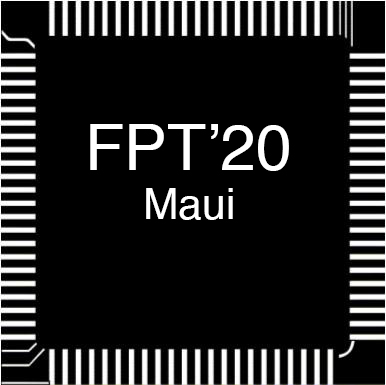
Call for Papers
************************************************************************
Second CALL FOR PAPERS
The International Conference on Field-Programmable Technology (FPT'20)
https://www.ece.ucf.edu/FPT2020
7 to 11 December, 2020
************************************************************************
Dear Colleagues, In light of the continued uncertainty surrounding the Covid-19 situation, FPT'20 will be a virtual conference and the Design Competition has been cancelled.
Title and abstract due : Jul 15, 2020 Aug 05, 2020 (Final)
Paper submission due : Jul 22, 2020 Aug 12, 2020 (Final)
Contest entry due : Sep 15, 2020 CANCELLED
Reviews due : Sep 30, 2020 Oct 05, 2020 (Updated)
Notification of acceptance : Sep 29, 2020 Oct 30, 2020 (Updated)
Final copy due (camera ready) : Oct 30, 2020 Nov 16, 2020 (Updated)
Workshops : Dec 07-08, 2020
FPT'20 Conference : Dec 09-11, 2020
The FPT conference is the premier conference in the Asia-Pacific region on field-programmable technologies including reconfigurable computing devices and systems containing such components. Field-programmable devices promise the flexibility of software with the performance of hardware. The development and application of field-programmable technology have become important topics of research and development. Field-programmable technology is widely applied, in high-performance computing systems, embedded and low-power control instruments, mobile communications, rapid prototyping and product emulation, among other areas.
Submissions are solicited on new research results and detailed tutorial expositions related to field-programmable technologies, including but not limited to:
Tools and Design Techniques for field-programmable technology including placement, routing, synthesis, verification, debugging, runtime support, technology mapping, partitioning, parallelization, timing optimization, design and run-time environments, high-level synthesis (HLS) compilers, languages and modeling techniques, provably-correct development, intellectual property core-based design, domain-specific development, hardware/software co-design.
Architectures for field-programmable technology including field-programmable gate arrays, complex programmable logic devices, coarse-grained reconfigurable arrays, field-programmable interconnect, field-programmable analogue arrays, field-programmable arithmetic arrays, memory architectures, interface technologies, low-power techniques, adaptive devices, reconfigurable computing systems, high-performance reconfigurable systems, evolvable hardware and adaptive computing, fault tolerance and avoidance.
Device technology for field-programmable logic including programmable memories such as non-volatile, dynamic and static memory cells and arrays, interconnect devices, circuits and switches, and emerging VLSI device technologies.
Applications of field-programmable technology including accelerators for biomedical/scientific/neuro-morphic computing and machine learning, network processors, real-time systems, rapid prototyping, hardware emulation, digital signal processing, interactive multimedia, machine vision, computer graphics, cryptography, robotics, manufacturing systems, embedded applications, evolvable and biologically-inspired hardware.
Education for field-programmable technology including courses, teaching and training experience, experiment equipment, design and applications.
Note that simply implementing an application using an FPGA is not considered a sufficient research contribution. Application-based papers should emphasize novel design techniques, novel use of embedded resources, or clearly articulated and measured system performance benefits.
Submission Guidelines
The program committee solicits full and short papers describing original research in field-programmable technology, including, but not limited to, the areas of interest indicated above. Papers should be submitted electronically in PDF format, following the IEEE style. Full papers can include up to 8 pages of content plus unlimited pages for references. Short papers are limited to 4 pages in total, including references.
Manuscripts must not identify authors or their affiliations for double-blind review. Papers that identify authors will NOT be considered. Please use the online system for submission. For details, please visit the FPT'20 website.
Call for workshops/tutorials
We call for workshops and tutorials which will be held in advance of the conference. For details, please visit the FPT'20 website.
:::: Committees ::::
General Chair
Mingjie Lin (University of Central Florida, USA)
Program Co-Chairs
Qiang Liu (Tianjin U., China)
Oliver Sinnan (University of Auckland, New Zealand)
Publicity Co-Chairs
Ameer Abdelhadi (Imperial College London, UK)
David Boland (Sydney U., Australia)
Haohuan Fu (Tsinghua U., China)
Kentaro Sano (AICS, Riken)
Ray Cheung (City University of Hong Kong)
He Li (University of Cambridge)
Poster/Demo Session/PhD Forum Chairs
Shaojun Wang (Harbin Institute of Technology, China)
Zhilei Chai (Jiangnan U. China)
Sponsor Chair
Lingli Wang (Fudan U., China)
Design competition Chair
Lin Gan (Tsinghua U., China)
Minoru Watanabe (Shizuoka U., Japan)
Publication Chair
Yu Bai (California State University, USA)
Workshop/tutorial session Chair
Alawad, Mohammed (Oak Ridge National Lab, USA)
Industrial session Chair
Yi Shan (Xilinx)
Financial Chair
Miaoqing Huang (University of Arkansas, USA)
